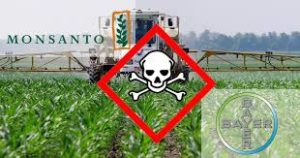16
Nov
Over One million People Ask Government to Block Bayer-Monsanto Merger
(Beyond Pesticides, November 16, 2017) With a petition signed by over one million people, farming, consumer, and environmental groups called on the U.S. Department of Justice (DOJ) this week to block the  proposed merger of Bayer (BAYN) and Monsanto (MON). The signatures were delivered as two new reports reveal devastating impacts that will be caused by the merger on consumers and farmers, including higher food prices, less innovation, limited seed choices, and escalating dependency of toxic chemical inputs in food production.
proposed merger of Bayer (BAYN) and Monsanto (MON). The signatures were delivered as two new reports reveal devastating impacts that will be caused by the merger on consumers and farmers, including higher food prices, less innovation, limited seed choices, and escalating dependency of toxic chemical inputs in food production.
On Tuesday November 14, 2017, Friends of the Earth, SumOfUs and the Open Markets Institute released an analysis, “Bayer-Monsanto Merger: Big Data, Big Agriculture, Big Problems,” which explores the implications of a combined biotechnology, chemical, and seed platform owned by Bayer and Monsanto and how it may impact competition and farmer choice. The release of the analysis coincided with a hearing on technology in agriculture and data-driven farming in the U.S. Senate Committee on Commerce, Science, & Transportation.
Consumer Federation of America also released a report, “Mega-Mergers in the U.S. Seed and Agrochemical Sector the Political Economy of Tight Oligopolies on Steroids and the Squeeze on Farmers and Consumers.” The report uses the concept of a “tight oligopoly on steroids” to examine how the unique characteristics of the Bayer-Monsanto merger magnify their market power in the seed/agrochemical sector and squeeze farmers and consumers.
In late 2016, Monsanto and Bayer announced a $66 billion merger. The Department of Justice is in the midst of reviewing it, and a decision is expected in late 2017. Should Bayer and Monsanto merge, the entity will become:
• The world’s largest vegetable seed company, with a virtual lock on broccoli, carrots, and onions.
• The world’s largest cotton seed company, responsible for the seed for about 70% of all the cotton grown in the US.
• Along with another company (Dow-DuPont), control 77% of all the seed corn in the U.S.
• The world’s largest manufacturer and seller of herbicides.
• The world’s largest owner of the intellectual property/patents for herbicide tolerance seed traits: 69% of all herbicide tolerance traits approved for use in the U.S. for alfalfa, canola, cotton, corn, soybean, and wheat.
Farmers can expect increased seed prices, reduced availability of untreated, non-genetically engineered (GE) seed, greater reliance on pesticides and exposures to farmworkers and the environment. Increased cost of farming will be passed on to consumers, and organic foods will face additional difficulties as the market dominance of GE crops is consolidated and deepened. There are fears that a farming system dominated by GE seeds and pesticide-intensive production will lead to increased contamination of the environment due to pesticide and genetic drift, water contamination, and impacts to non-target organisms.
“Bayer and Monsanto’s toxic mega-merger is a danger to our planet and everyone living on it,” said Erich Pica, president with Friends of the Earth. “Over on million Americans have called on the Department of Justice to protect our farmers and families from the consolidation of corporate power. Bayer and Monsanto’s merger is a direct threat to the future of people and our environment. The Justice Department must put on the breaks and stop this merger.”
State attorneys general (AGs) have already joined together to investigate federal antitrust concerns related to the mergers of the agrichemical giants. These states are concerned that, following as merger, the entities may increase the cost of farm inputs and have less incentive to compete to introduce better and cheaper products. The involvement of the state AGs will increase scrutiny of these mega deals, as they were previously only being reviewed at the federal level by antitrust experts at the Department of Justice. While it will ultimately be up to DOJ to decide to challenge either of the mergers, the state AG offices will be crucial in providing information on how the mergers fall under their jurisdiction. This method of investigation has worked to stop mergers in the past, when DOJ, with help from the states, sued to stop two controversial health insurance provider deals in Aetna Inc’s plan to buy Humana Inc. and Anthem Inc.’s bid for Cigna Corp. In that case, 11 states and the District of Columbia joined the federal government in the Anthem lawsuit, while eight states and Washington, DC, joined the Aetna lawsuit.
Petitions were collected by Action Aid, Avaaz, Center for Food Safety, Clif Bar Family Foundation/Seed Matters, CREDO, Food and Water Watch, Friends of the Earth, Organic Consumers Association, Organic Seed Alliance, Pesticide Action Network North America, Rural Advancement Foundation International, Sierra Club and SumOfUS. Beyond Pesticides, through its Action of the Week, generated thousands of comments to the Department of Justice and the Federal Trade Commission in opposition to the merger.
You can also reach out to your U.S. Senators and Representative to ask them to oppose the approval of a merger that consolidates seed availability. Encourage them to support the increased availability of organic seeds, which do not adversely affect soil, water or human health. Additionally, reach out to your state AG office and encourage them to join the merger investigations to ensure that the DOJ takes action to block the mergers.
All unattributed positions and opinions in this piece are those of Beyond Pesticides.










